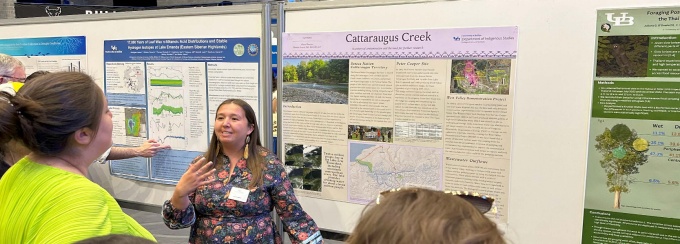Graduate Courses

IDS graduate student Alyssa Warrior speaking about her research during a campus poster session.
The graduate courses offered through the Department of Indigenous Studies are designed to provide critical skills for addressing research with Indigenous Nations, gaining an understanding of the impact of colonization, addressing imperialism, and conducting research using the parameters of Indigenous research methodologies. These interdisciplinary courses are open to students in all departments who are interested in Indigenous research and methodologies.
Sample Courses
IDS 501 Key Theories and Concepts in Indigenous Studies
This course relates debates in the field of Indigenous Studies to key intellectual movements and concepts (such as sovereignty, self-determination, colonialism, decolonization, etc.) seminal to the field. In this weekly seminar, members of the core and joint faculty of the Indigenous Studies Department present approaches to interdisciplinary studies and discuss their own research. Faculty whose work balances disciplinary and theoretical approaches with interdisciplinary approaches to Indigenous Studies will aim to demystify methods, particularly of the interdisciplinary sort, and introduce students to a wide range of research topics. It will explore concepts and critiques contributing to developing Indigenous communities' thoughts and practices. The debates and interventions to be considered concern changing boundaries of the field over time. By examining key concepts in the field, students can identify ethical issues related to research with Indigenous communities and come to know the department’s faculty.
IDS 502 Indigenous Historiographies
This seminar will involve the creation of a substantial historiography or research paper in the graduate student’s focus in Indigenous studies. Discussions will reference the themes of culture, governance, accommodation, adaptation, assimilation, agency, violence, resistance, and survival in Indigenous history while focusing on historical questions at the heart of recent scholarship analyzing relations between Indigenous peoples, nations, newcomers and those brought here through their own forced removals. How do specific relations form in the time period you are examining? What develops over time and how does human agency play a part on the development? How do differing ideas of gender, labor, land, ideologies and governance impact the historical moment and how is this reflected in archival material? What key elements become transformed as people meet in specific geographical regions?
IDS 503 Methods in Global Indigenous Studies
Since it is impossible to address all the various nations, genres, histories, etc. of Indigenous world views, this class will instead address the field of Critical Indigenous Studies and how it is unfolding today (including sovereignty, politics of recognition, environmental issues, colonialism, gender, race, and sexuality). By the end of the course, students will become familiar with key theorizations of colonial power and major discourses of critical Indigenous interventions and how they are being employed on the ground and across multiple fields.
IDS 504 Professional Seminar: Grant, Proposal, and Professional Writing
This course offers tools to (1) conceptualize and design a research project grounded in Indigenous methodologies and/or centered on Indigenous peoples; (2) write a clear, accessible, and rigorous research proposal; and (3) provide considered and constructive (even joyful) peer review and engagement, with particular focus on supporting each other as Indigenous Studies colleagues working across theoretical, methodological and substantive boundaries. Ultimately, this course helps students navigate this tricky terrain by fostering a culture of peer support and reciprocity, and by providing a preliminary conceptual vocabulary for understanding the diverse goals and standards of research design.
IDS 506 Indigenous Studies Pedagogy Workshop
This course takes seriously the practice of decolonizing a classroom by interrogating our methods of teaching in current environments. From learning age old pitfalls of addressing stereotypes and colonial anxiety to that of addressing Artificial Intelligence use in constructing assignments, the class will work together to produce a set of syllabi that reflect current Indigenous studies classrooms. This class will prepare students to be teaching assistants and be a future faculty teaching member.
IDS 530 Indigenous Political Theory and Action
This seminar will expose students to a broad range of scholarly and activist work on Indigenous political theory and action within the field of critical Indigenous Studies. We will cover topics that engage Indigenous epistemologies, treaties, governance, political mobilization through artistic and literary works, and the ever-changing context of relationships to the settler-states that occupy Indigenous territories. We will critically examine how theories and practices of Indigenous sovereignty intersect with ideas about gender, sexuality, race, culture, nationalism, and colonialism. Alongside a regional place-based focus on the Haudenosaunee, our seminar will also cover international Indigenous politics, large scale social movements and everyday practices of maintaining Indigenous life ways as important political projects.
IDS 550 Decolonial Participatory Action Research
In Indigenous contexts, participatory action research (PAR) is an increasingly standard research methodology. Involving community residents at every stage of the research process to facilitate radical democratic knowledge-production and social change, PAR holds much promise in allowing Indigenous peoples to set their own terms in research, and to ensure that the research serves to benefit—rather than misrepresent or extract from—their communities. Yet, without rigorously and meaningfully incorporating Indigenous epistemologies, cosmologies, and methodologies into PAR, it risks perpetuating the long-standing colonial damage that research continues to inflict on Indigenous peoples. In this community-engaged class, students will learn about key concepts in designing decolonial PAR projects, while gaining hands-on experience with PAR through community partnerships.
